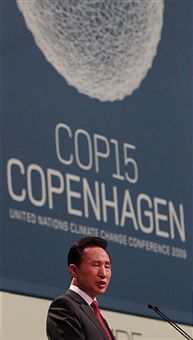 Eureka, the science magazine from The Times, is in many ways a brilliant accomplishment. Advertising is following readers in an online migration – but James Harding, the editor, personally persuaded advertisers that a new magazine, in a newspaper, devoted to science would work. And here it is: giving the New Scientist a run for its money every month.
Eureka, the science magazine from The Times, is in many ways a brilliant accomplishment. Advertising is following readers in an online migration – but James Harding, the editor, personally persuaded advertisers that a new magazine, in a newspaper, devoted to science would work. And here it is: giving the New Scientist a run for its money every month.
That’s why it’s such a shame that today’s magazine opens on an anti-scientific piece denouncing those who disagree with the climate consensus. My former colleague Ben Webster, now the paper’s environment correspondent, is an energetic and original journalist – so it’s depressing to see his skills deployed in a game of hunt-the-heretic.
The magazine’s list of 100 greatest scientists is preceded by a heretic list of five ‘sceptics’ who are denounced on the flimsiest of grounds. Bjorn Lomborg is no.1. “He appears to concede that man-made global warming is a serious problem,” says Webster. Appears to? He has explicitly stated this, time and time again. His argument is that we must introduce proportion to the debate: ask what these expensive solutions actually achieve. And ask whether, if saving lives is the priority, money could be spent in better ways. Webster finds him guilty of “producing alarming statistics that suggest cutting carbon is too expensive”. Strikingly Webster does not say that his figures are wrong, or exaggerated. To dismiss studies because the conclusion is wrong is not science, but spin.
Next, Nigel Lawson and his Global Warming Policy Foundation. “This ‘think tank’ of retired grandees gives sceptic arguments a veneer of authority,” he complains. Might that be because the board’s credentials are impeccable? That they include former Cabinet Secretaries with no skin in the climate change fight – other than dismay at the anti-intellectual way the debate is conducted?
Bafflingly, Sarah Palin is next. She is credited with “exploiting the University of East Anglia emails to undermine last December’s Copenhagen summit”. Can anyone remember the part in that summit where things were going swimmingly until Palin intervened? My recollection is of a summit buckling under the weight of its own contradictions. The idea of sourcing the doubt – even the emails – to Palin is certainly novel. Webster also claims that her influence “helps to explain” why Obama ‘has shelved plans for legislation to cut back on US emissions”.
Christopher Monckton, the sceptic peer, is next – like Palin, his intellectual influence is great. “He plays to full houses in the US and Australia”. This is reminiscent of Naomi Klein’s theory in No Logo: that free market economics have no force in their own right, but emanate from Bad People (Friedman was hers).
Steve Macintyre is perhaps my favourite. “Feared by climate scientists for his doggedness in hunting down flaws or inconsistencies,” Webster says – and this is, apparently, enough to qualify him for the “infamous five” list.
Proper science invites refutation. Denouncing people for pointing out “flaws” is not science.
Webster finishes off by saying that sceptics are over 60 “so few will be alive in 20 years’ time to see the consequences of their efforts to resist global action on climate change”. But this raises another point.
At the launch of Nigel Lawson’s excellent think tank (which acknowledges that global warming is real and a problem – a point Webster didn’t make, no doubt due to lack of space), I was approached by one of its directors – someone, again, with a distinguished record in public life. “Looking around, most of us are retirement age,” he said. “That’s because if you’re young, and you raise the slightest objection, your career is over. You will be ostracised, and if you have any profile the press will destroy you. So its only my generation, with nothing to lose, who can make these arguments in this hysterical intellectual climate.”
Webster’s piece proves his point. Even journalists, whose job is normally to probe and question, have become cheerleaders for a cause. There is a mood of hysteria – and before CoffeeHousers go the other way and attack Webster, I’d like to say that he is not one of those journalists. His reporting in Copenhagen and afterwards fully reflected both sides of the debate – which is why it’s so strange to see this piece from him today. And even stranger to see it commissioned by a science supplement – when scientific progress depends on the the type of refutation and questioning which Lomborg, Lawson and Macintyre have brought to the debate.
As for Palin and Monckton – Webster wasn’t really serious. I hope.







Comments